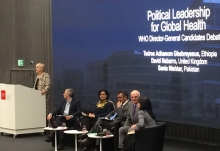Towards a renaissance of the World Health Organization

While there has been significant improvement in the health status of people, generally, with economic growth and technological development, this has not been sufficient to meet the goal of health for all.
In recent times, the world has become characterised by “mounting challenges with profound health implications.” Global governance has become more complex with increasing influence of big business and weakening of democratic instituations. The governance of global health has become more political, while the WHO faces increasing funding challenges.
Meanwhile there are opportunities for “health for all” to be more than a mere slogan. There is enough wealth in the world to make this possible. But this requires structural changes in countries, as well as a World Health Organization which is strong, credible and bold in advancing the cause of public health care for all. This is the context within which the World Health Assembly will elect the next DG in May.
PSI has joined 27 other civil society organisations to send a message to Member States of the WHO and the world at large, on The WHO we want and the leadership WHO needs, with the aim of influencing the debate, as non-state actors. Recognising the leading voice WHO has among international and multilateral actors in pushing the agenda for universal public health care, signatories to the statement have called for WHO to redouble its efforts in setting priorities and deciding on strategy implementation from a global public health perspective rather than being guided by individual donor interests and priorities.
The civil society statement also called for a WHO which reinvigorates Member States’ protagonism and commitment to public health, including by providing sufficient non-earmarked contributions and adequately protecting the organisation from private interests.
The civil society organisations strongly believe that the new WHO DG must be a strong and recognizable leader who is a public health champion. S/he must be both a diplomat, who can focus attention on the political, economic, social and environmental determinants of health, promote health justice, diversity, democracy, and accountability, and be a capable manager who can introduce transversal initiatives and effective decision-making processes.
The three WHO DG candidates are: Sania Nishtar from Pakistan, David Nabarro from the United Kingdom and Tedros Adhanom Ghebreyesus from Ethiopia. PSI and several other organisations who are signatories to the civil society statement participated at the moderated discussion on political leadership for global health organised for the candidates at The Graduate Institute, Geneva, by Chatham House, United Nations Foundation and The Rockefeller Foundation.
Each of the candidates is a brilliant and experienced medical and health practitioner and policy-maker. It was, however, disheartening that they all stopped shy of committing to take a firm stance in curbing the growing influence of private interests, including philanthropies, on WHO. This could reflect fears of the power that such interest could have on the horse-trading involved in the election process. It also shows that the civil society movement must equally build on its advocacy and mobilisation of public opinion in the unfolding period, to win a renaissance of the WHO and the aim of health for all.

